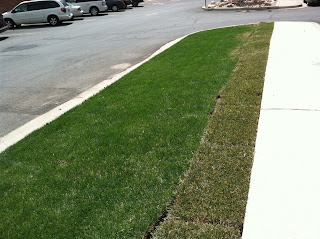Maybe it is because of cost, maybe it is the lost hope of the tree recovering, and maybe it a plan to give the tree one last bit of glory.
I can't say this ivy treatment works for me, but for others it might. What do you think?
Manana!
 |
| I get stares for wearing election day stickers, but any little nudge to get people working for their communities is well worth it. |
 |
| A lawn repair at Lehi city hall. Repairing turf is very water costly and should be avoided durring water restrictions and hot periods. |